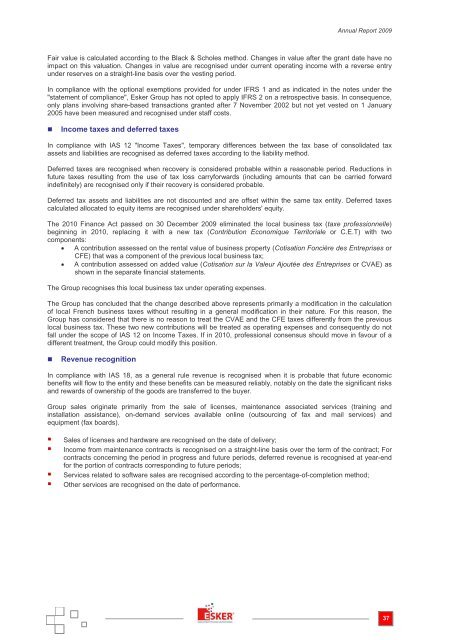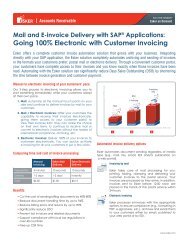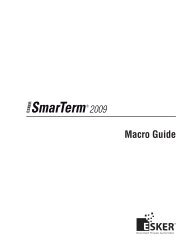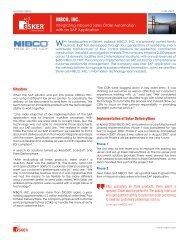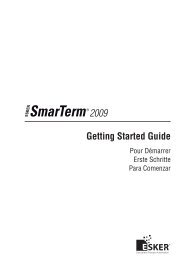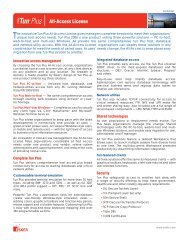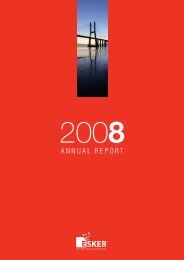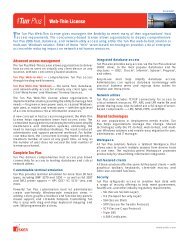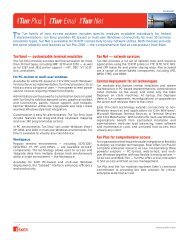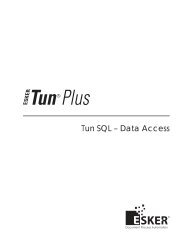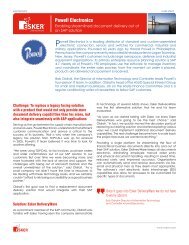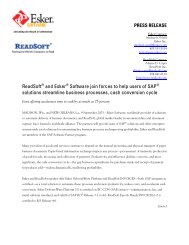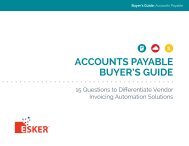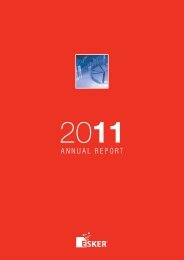Download the PDF file - Esker
Download the PDF file - Esker
Download the PDF file - Esker
You also want an ePaper? Increase the reach of your titles
YUMPU automatically turns print PDFs into web optimized ePapers that Google loves.
Annual Report 2009<br />
Fair value is calculated according to <strong>the</strong> Black & Scholes method. Changes in value after <strong>the</strong> grant date have no<br />
impact on this valuation. Changes in value are recognised under current operating income with a reverse entry<br />
under reserves on a straight-line basis over <strong>the</strong> vesting period.<br />
In compliance with <strong>the</strong> optional exemptions provided for under IFRS 1 and as indicated in <strong>the</strong> notes under <strong>the</strong><br />
"statement of compliance", <strong>Esker</strong> Group has not opted to apply IFRS 2 on a retrospective basis. In consequence,<br />
only plans involving share-based transactions granted after 7 November 2002 but not yet vested on 1 January<br />
2005 have been measured and recognised under staff costs.<br />
• Income taxes and deferred taxes<br />
In compliance with IAS 12 "Income Taxes", temporary differences between <strong>the</strong> tax base of consolidated tax<br />
assets and liabilities are recognised as deferred taxes according to <strong>the</strong> liability method.<br />
Deferred taxes are recognised when recovery is considered probable within a reasonable period. Reductions in<br />
future taxes resulting from <strong>the</strong> use of tax loss carryforwards (including amounts that can be carried forward<br />
indefinitely) are recognised only if <strong>the</strong>ir recovery is considered probable.<br />
Deferred tax assets and liabilities are not discounted and are offset within <strong>the</strong> same tax entity. Deferred taxes<br />
calculated allocated to equity items are recognised under shareholders' equity.<br />
The 2010 Finance Act passed on 30 December 2009 eliminated <strong>the</strong> local business tax (taxe professionnelle)<br />
beginning in 2010, replacing it with a new tax (Contribution Economique Territoriale or C.E.T) with two<br />
components:<br />
• A contribution assessed on <strong>the</strong> rental value of business property (Cotisation Foncière des Entreprises or<br />
CFE) that was a component of <strong>the</strong> previous local business tax;<br />
• A contribution assessed on added value (Cotisation sur la Valeur Ajoutée des Entreprises or CVAE) as<br />
shown in <strong>the</strong> separate financial statements.<br />
The Group recognises this local business tax under operating expenses.<br />
The Group has concluded that <strong>the</strong> change described above represents primarily a modification in <strong>the</strong> calculation<br />
of local French business taxes without resulting in a general modification in <strong>the</strong>ir nature. For this reason, <strong>the</strong><br />
Group has considered that <strong>the</strong>re is no reason to treat <strong>the</strong> CVAE and <strong>the</strong> CFE taxes differently from <strong>the</strong> previous<br />
local business tax. These two new contributions will be treated as operating expenses and consequently do not<br />
fall under <strong>the</strong> scope of IAS 12 on Income Taxes. If in 2010, professional consensus should move in favour of a<br />
different treatment, <strong>the</strong> Group could modify this position.<br />
• Revenue recognition<br />
In compliance with IAS 18, as a general rule revenue is recognised when it is probable that future economic<br />
benefits will flow to <strong>the</strong> entity and <strong>the</strong>se benefits can be measured reliably, notably on <strong>the</strong> date <strong>the</strong> significant risks<br />
and rewards of ownership of <strong>the</strong> goods are transferred to <strong>the</strong> buyer.<br />
Group sales originate primarily from <strong>the</strong> sale of licenses, maintenance associated services (training and<br />
installation assistance), on-demand services available online (outsourcing of fax and mail services) and<br />
equipment (fax boards).<br />
• Sales of licenses and hardware are recognised on <strong>the</strong> date of delivery;<br />
• Income from maintenance contracts is recognised on a straight-line basis over <strong>the</strong> term of <strong>the</strong> contract; For<br />
contracts concerning <strong>the</strong> period in progress and future periods, deferred revenue is recognised at year-end<br />
for <strong>the</strong> portion of contracts corresponding to future periods;<br />
• Services related to software sales are recognised according to <strong>the</strong> percentage-of-completion method;<br />
• O<strong>the</strong>r services are recognised on <strong>the</strong> date of performance.<br />
37


